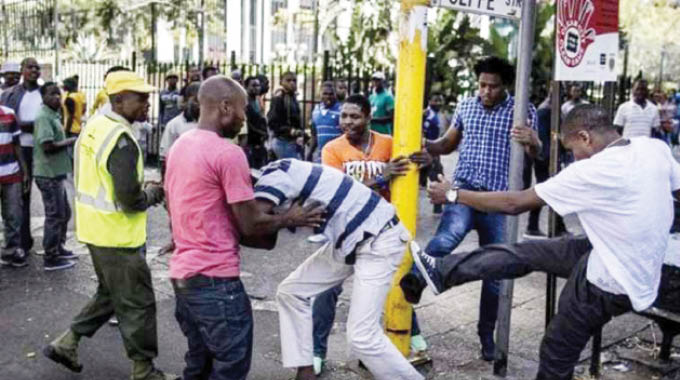Savaging feeding hands

Stephen Mpofu, Perspective
“United we stand, divided we fall.”
The validity of the wise words above by John Dickinson, a founding father of the United States of America and a politician from Philadelphia, has stood the test of time and ought now by the grace of God to be defused by mass communication media to capitals and seats of government in African nation states as a rude awakening to the imperatives of unity whether the weather be good or bad so that our African race may weather the weather and walk with our heads thrust high.
This is particularly relevant in the wake of waves of barbaric xenophobia attacks on blacks which recently swept across neighbouring South Africa with Zimbabwean nationals among other black victims whose businesses were looted or destroyed with cars being torched and people doused with petrol, shot and set alight by bands of thugs and with police helpless to do anything about the violence or, as some of the victims claimed, apparently running with hares and hunting with the hounds.
The violence, and escalation from previous attacks on black nationals rightfully riled leaders across the African continent after which Pretoria unleashed emissaries on a diplomatic blitz to African countries including our own to render Pretoria’s apologies for the attacks that, according to press reports, had Nigeria recalling as many as 600 of its nationals from South Africa where they engaged in business, with our consulate in South Africa sheltering and helping with the repatriation of Zimbabwean victims of the heinous attacks.
The implication of Dickson’s “united we stand, divided we fall” is that it should be viewed as a deafening call on Africans to unite across all ranks, starting from regional, political and economic communities such as Sadc, Ecowas in West Africa and other similar bodies elsewhere on the continent with a solid manifestation of that unity value at the African Union, overseer of political, social and economic activities on our continent; otherwise our black race will render itself a laughing stock in the eyes of the rest of the global village.
Some relatives of Zimbabwean victims have speculated, although without valid evidence, that a sinister white hand might have been behind the black-on-black pandemoniums to do in the black government in Pretoria so that the whites who had the best of all things during apartheid and obviously yearn for those glorious days gone by, may again reign supreme should the ANC government fall as a result of the violence.
Some Zimbabwean relatives of victims of the latest violence are known to be wondering as to why the host government did not deploy troops or the paramilitary to quell the violence when it became apparent that the police force was overwhelmed or that by their pussy footing some of its members condoned the attacks on foreigners alleged to be taking away jobs from indigenous people.
This writer suspects that had whites and other non-blacks in South Africa been the victims of attacks by the blacks those in foreign lands who feed the UN and keeps it on its feet might have quickly rallied to the support of non-black victims by rushing in a military force to restore order as a way of protecting their kith and kin.
Such a response would be in keeping with the “we are mightier than you” philosophy that continues to pervade the minds of those who invaded, colonised and ruled our black race by force until the armed revolution and non-violent campaigns became the winds of change sweeping across the continent with freedom, independence and self-determination becoming a new feature in the political arena in Africa.
In a previous discourse in these columns we suggested that industrialisation regionally and continentally would bring an end to economic migration which has seen Africans from poorer states trooping over to relatively richer sister states in search of greener pastures.
In the circumstances, Zimbabweans and Nigerians among other Africans have set up businesses in South Africa to employ and feed locals in a brotherly or sisterly gesture to help in the development of a black sister country, so that its citizens may attain higher levels of economic and social advancement.
The contribution by Zimbabweans and other foreign nationals to the economic and social welfare of a sister state ought to be appreciated and not condoned as though the Zimbabweans and the others are there to cart off the wealth of Africa’s second biggest economy back to their native countries.
In fact, do South Africans believe that investment in their country from oversees is holier than that from fellow black countries?
Curiosa and curiosa.
Many people, including this writer wonder if regional economic unity can stand the test of the violence akin to xenophobic barbarism which has repeatedly reared up its ugly head in that Southern African state.
It is probably time political leaders and African political and economic communities visited the far reaching implications of unity for these groupings and the continent as a whole because the finer details of black solidarity, albeit ambiguous to small minds, suggest that the sons and daughters of our vast continental land mass must wilfully scratch one another’s political and economic backs as well as search and destroy lice and dandruff in one another’s hair so that with clear and focused minds we, Africans, may blitz our way through opaque futures without trepidation and into more developed, stable and happier nations.
Some Zimbabwean relatives of victims of the latest violence are known to be wondering as to why the host government did not deploy troops or the paramilitary to quell the violence when it became apparent that the police force was overwhelmed or that by their pussy footing some of its members condoned the attacks on foreigners alleged to be taking away jobs from indigenous people









Comments